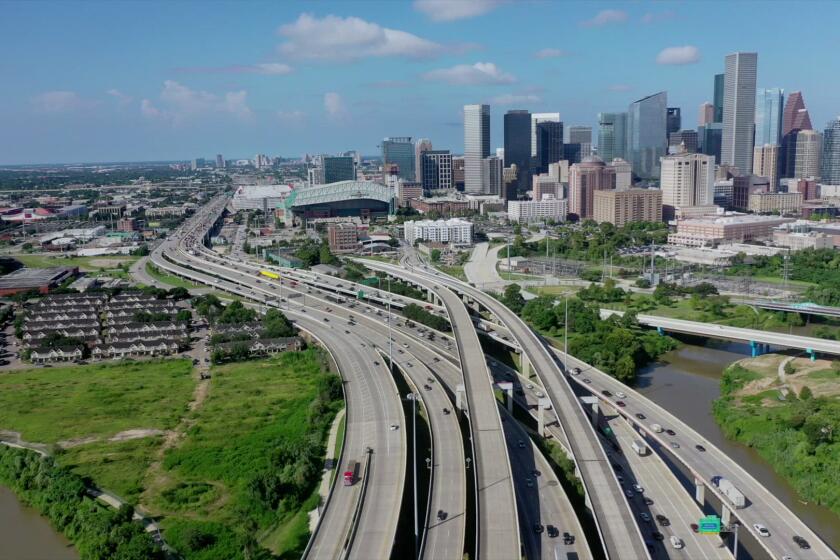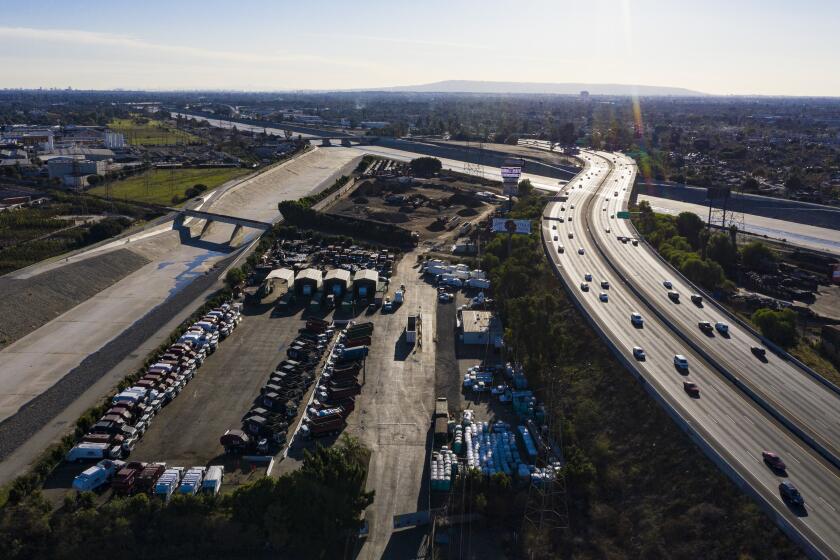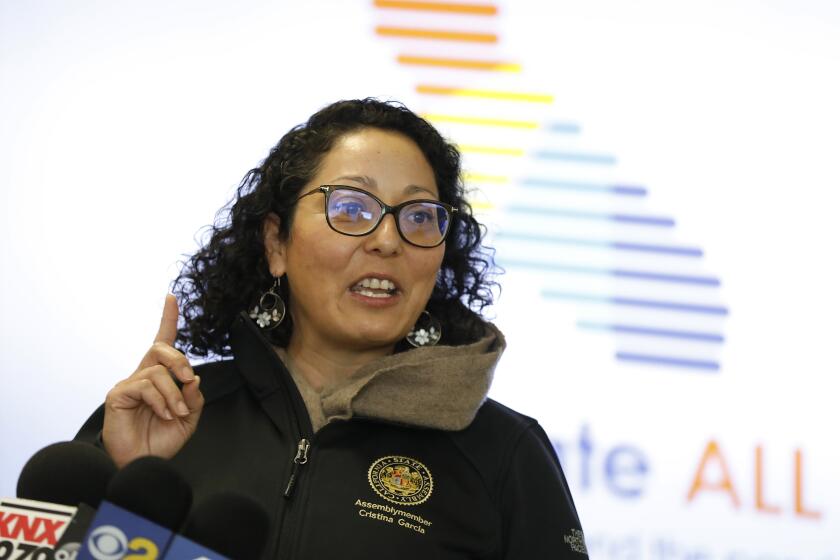A bid to stop freeway expansions in California hits a roadblock: Organized labor
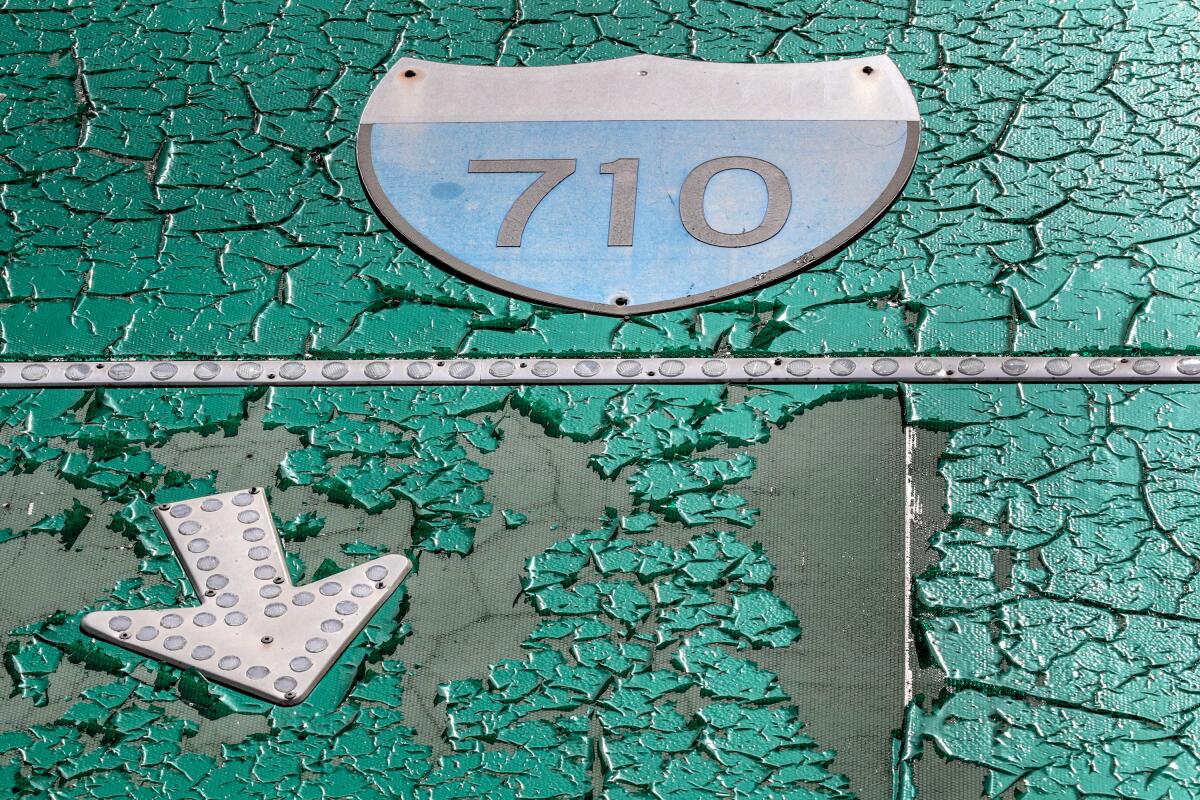
- Share via
After more than 60 years and 15,000 miles of highway and interstate construction in California, momentum is growing to end the state’s freeway expansion era.
Top state transportation officials recently pulled the plug on a $6-billion interstate widening in L.A. County and are pledging to funnel billions of dollars toward mass transit and road repairs. Multiple state lawmakers want to do the same, including one proposal that would prohibit freeway expansions in underserved communities across California, an effort that would be the first of its kind in the country.
Supporters of this approach cite freeways’ legacy of displacement and pollution in Black and Latino communities, the need to fight climate change and research showing that widening freeways in cities doesn’t ultimately ease congestion.
No longer will the state add freeway lanes solely to allow more cars and trucks to use them, said Toks Omishakin, secretary of the California State Transportation Agency, which oversees the state’s transportation network.
“That is the past,” Omishakin said. “We cannot do projects like that moving forward.”
Yet the efforts to end California’s embrace of freeways face opposition from a powerful group: trade unions. Labor leaders contend that limiting freeway widening overestimates the state’s ability to transition from an automobile-centered culture and does so at the expense of good-paying jobs.
“We’re not the organization of ‘no’ when it comes to climate change. We’re the organization of ‘slow,’” said Joseph Cruz, executive director of the California State Council of Laborers. “Put a plan together where you make the other transportation opportunities available before you talk about shutting down freeways.”
Cruz’s group and other labor organizations are against the most aggressive plan to stymie freeway expansion, Assembly Bill 1778, written by Assemblymember Cristina Garcia (D-Bell Gardens), which would block freeway widening in areas of the state with high levels of pollution and poverty.
The bill, which advanced following a legislative committee hearing last month, was inspired by a recent Times investigation that documented the effects of freeway construction over the last three decades.
The Times found that more than 200,000 people nationwide have lost their homes because of federal road projects during that time, and that some of the country’s largest recent highway expansions, including in California, have forced out residents in Black and Latino neighborhoods at disproportionately high rates. And that’s in addition to the more than 1 million people pushed out during the initial period of freeway building in the mid-20th century via routes that often targeted Black communities for demolition.
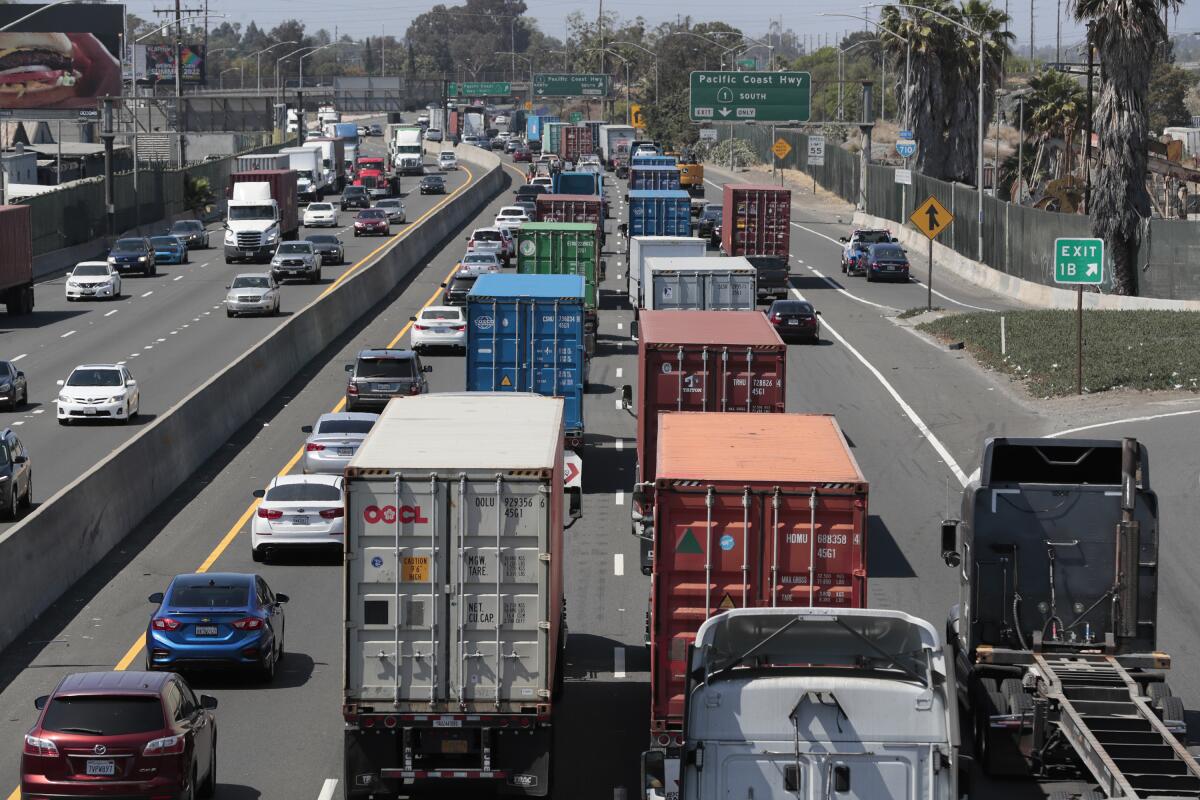
Some of the country’s largest recent highway expansions have inflicted another round of displacement in largely Black and Latino communities.
“Freeways and cars and driving might be synonymous with California,” Garcia said. “Us trying to be leaders on social justice, healing communities, on environmental justice as well, is also in line with who California is.”
But Andrew Meredith, president of the State Building and Construction Trades Council of California, which represents 450,000 construction workers, said that the road network must continue to grow to support drivers and the state’s economy.
“The idea that we’re displacing people that are living close to the highways, this is natural in the terms of the way development happens,” Meredith said. “Infrastructure sometimes has to come first. If we made decisions completely based on the impacts on relatively small amounts of people, nothing would ever get done.”
He contended that Garcia’s bill would instead harm low-income residents living near freeways, arguing its passage would hurt their commute times.
But in urban areas at least, increasing evidence shows freeway widenings reduce traffic only temporarily and can actually worsen congestion long term by encouraging more driving. California’s most famous example of the phenomenon is the Interstate 405 widening through L.A.’s Sepulveda Pass a decade ago, which required a multiday closure dubbed “Carmageddon.” Within a year of the $1-billion project’s completion, rush-hour traffic was just as tied up as it was beforehand.
Residents who live close to freeways are more likely to suffer from asthma and increased cancer risks related to vehicle pollution, according to the California Air Resources Board, and widening freeways enlarges the areas subject to the greatest problems.
The situation is worst for those living within 500 feet of a freeway as particulate pollution levels are 70% higher there, the agency found. A 2017 Times analysis similarly determined that pollution readings next to the 110 and 5 freeways were three to four times higher than in neighborhoods farther from traffic.
Beyond air quality concerns, continued expansion of California’s freeway network threatens the state’s target of reducing carbon emissions to 40% below 1990 levels by 2030.
More than 40% of the state’s greenhouse gas emissions now come from transportation, the largest of any sector. The state’s climate regulators have long concluded that even a rapid increase in electric vehicle usage won’t be enough to reach climate goals unless that’s combined with an overall reduction in driving.
With the new $1 trillion in infrastructure spending signed by President Biden last year, the same climate change issues are emerging nationally.
A December report from the Georgetown Climate Center found that if those dollars are prioritized toward repairing existing roads and investing in transit and other low-carbon transportation options, then the massive spending plan could decrease greenhouse gas emissions.
By contrast, if even just a little more than a quarter of the new funding were to go toward freeway expansion, then the infrastructure bill would result in more carbon emissions than if nothing had passed, the report concluded.
“The climate crisis is imminent,” said Assemblymember Laura Friedman (D-Glendale), who chairs the Assembly Transportation Committee. “We would be committing a huge crime to not take action knowing what we know.”
Friedman has written her own legislation, Assembly Bill 2438, which would require the state’s transportation spending to align with its climate change targets and, as a consequence, limit freeway widening. Her bill also is opposed by labor groups.
“We can’t both say we need to change and then say there’s too many reasons we can’t change,” she said.
Already, state officials are taking some action to block freeway expansions. Last year, Omishakin, who was then the director of the California Department of Transportation, said that a proposed 18-mile widening of the 710 Freeway from the ports of Long Beach and Los Angeles to the 60 Freeway in East Los Angeles shouldn’t move forward because of pollution, climate change and displacement concerns.
In February, Caltrans formally pulled out of the project’s environmental review, effectively killing an expansion that’s been on the books for two decades.
Officials may scrap a plan to expand the 710 Freeway after the U.S. Environmental Protection Agency finds the project might increase air pollution.
“As we double down on our approach on equity and climate change and safety, how do we make sure these projects in these early phases actually fit that?” Omishakin said.
State transportation officials have been reexamining planned freeway widenings across California to determine whether they should move forward, he said. Omishakin declined to name other projects under review, though he noted that a proposed expansion of the 5 and 605 freeways in southeast L.A. County has similar pollution and displacement concerns as the canceled 710 effort.
Still, Omishakin said some freeway widening projects would continue, including those under construction or about to break ground. Proposals to add carpool or toll lanes to freeways also could be considered, he said. And the state plans to continue prioritizing repairs to existing roads and freeways.
Gov. Gavin Newsom’s administration has yet to take a position on either Garcia or Friedman’s bills, both of which would commit the state to a more assertive policy against freeway expansion.
Besides labor organizations, many other interests are opposed to the legislation, including business groups, road contractors and local transportation agencies, which cite recent voter-approved tax measures to fund infrastructure projects, including highway widening.
“Worsening bottlenecks in the supply chain will hurt the state’s ability to grow well-paying jobs and make the critical investments in the infrastructure we need to address the current goods movement crisis and build a more resilient system moving forward,” said Rob Lapsley, president of the California Business Roundtable, an organization that represents many of the state’s largest companies.
A California legislator has proposed blocking state funding and permits for freeway expansions in poor and polluted neighborhoods.
Nevertheless, labor is likely the biggest hurdle. The building and construction trades are among the most influential lobbies within the Democratic Party coalition that controls all statewide elected offices and more than two-thirds of lawmakers in both houses of the Legislature.
Freeways are just the latest front in a long-standing battle between environmental and labor organizations over policies affecting the state’s climate change goals, including disputes over solar panel installation and the future of oil refineries, many of which employ union workers.
Omishakin said that he isn’t concerned about labor’s stance on the state moving away from freeways. The huge infusion of infrastructure dollars, both from increased gas taxes approved by the Legislature in 2017 and the federal infrastructure bill, should ease any problems.
Newsom’s proposed transportation budget for next year is $15 billion, and the state is likely in line for more than $40 billion in funding — the bulk of which is dedicated to highway programs — over the next five years through federal transportation dollars.
“We’re about to have more money being spent in transportation than at any time in the history of the state,” Omishakin said. “It’s a ripe opportunity for all of us, including labor, to make sure those investments are the right investments. The dollars are coming.”
More to Read
Sign up for Essential California
The most important California stories and recommendations in your inbox every morning.
You may occasionally receive promotional content from the Los Angeles Times.
